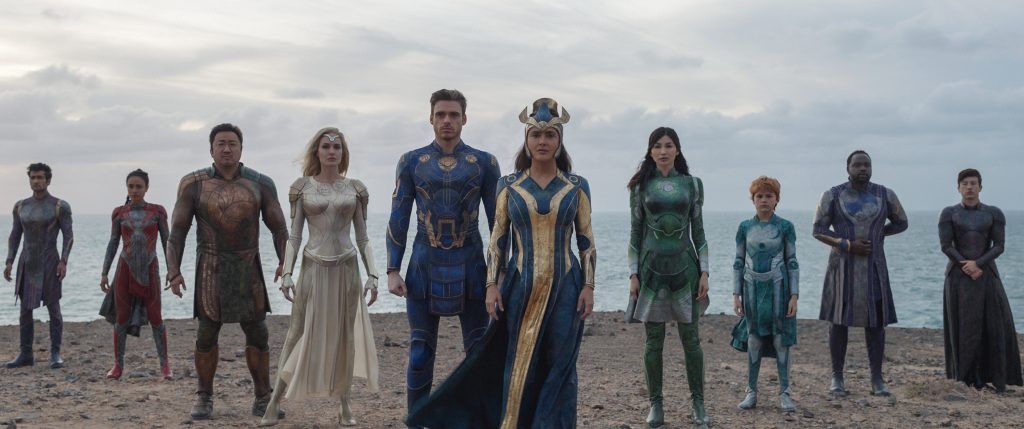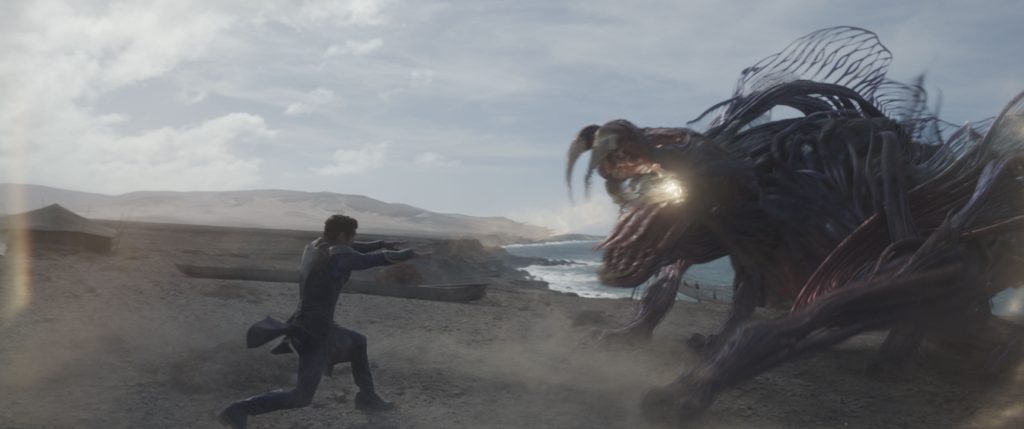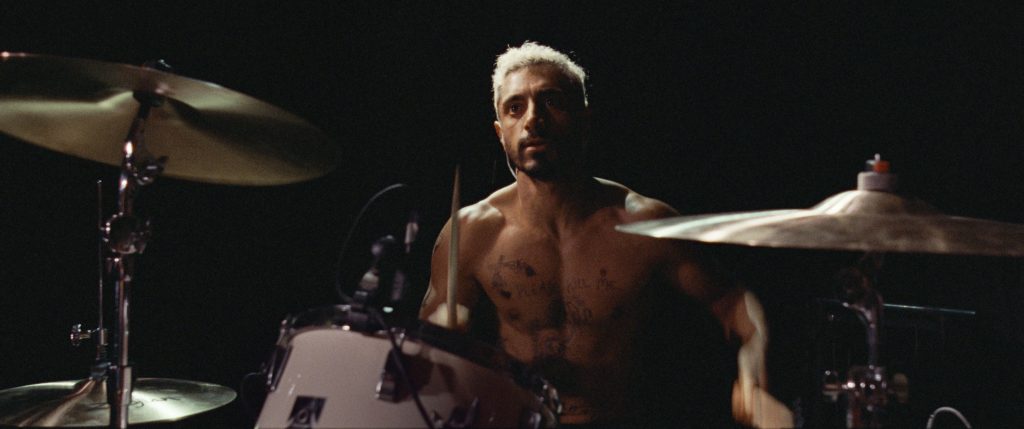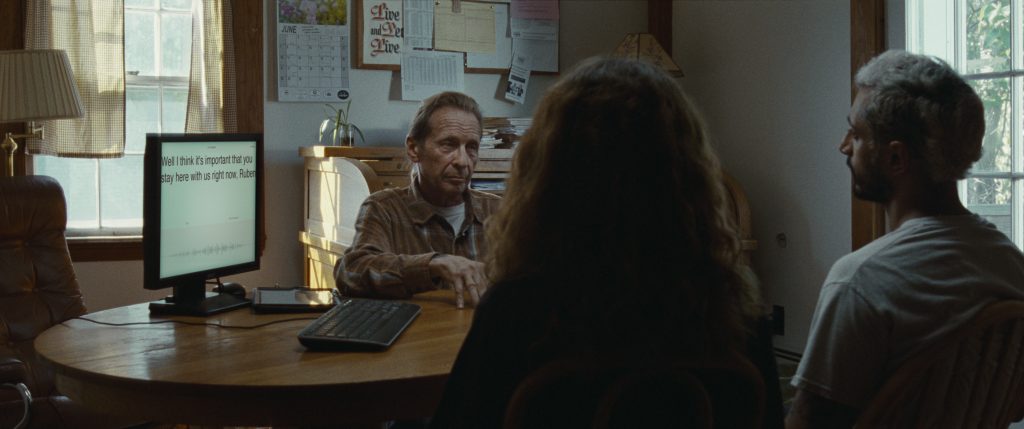October 26, 2021
by Carla Hay

Directed by Chloé Zhao
Culture Representation: Taking place in various parts of the universe, the superhero action film “Eternals” features a racially diverse cast of characters (white, Asian, Latino and African American) portraying superheroes from outer space and human beings.
Culture Clash: The superheroes, who are known as Celestials, find out that their arch-enemy demon creatures, which are called Deviants, have not all been killed off and are back with a vengeance.
Culture Audience: “Eternals” will appeal primarily to people who are fans of the Marvel Cinematic Universe (MCU), but viewers should know in advance that “Eternals” is much slower-paced and has a less straightforward narrative than a typical MCU movie.

Sure, “Eternals” has big-budget visual effects, gorgeous cinematography and impressive production design, but the movie’s heart (under Zhao’s direction) remains in the artsy indie film culture of requiring viewers to think more about the psychology of the characters than about what’s shown on screen. There are many times in “Eternals” when what the characters do not say (and what they keep to themselves) can be as important as what they do say. “Eternals” is not a movie that spells things out easily for the audience.
However, with a large ensemble cast of characters that are based on Marvel Comics characters created by Jack Kirby, “Eternals” is disappointing in how these characters are introduced in such a jumbled way to movie audiences who might not be familiar with these characters. The movie’s title characters are Celestials: universe-wandering beings who look like humans but who actually have superhero powers, including the ability to fly, shoot lasers from their hands or eyes, and quickly heal from wounds.
Celestials, who can also live for centuries, are not immortal, but it’s rare for a Celestial to die. Celestials all share an energy source that can help them strengthen their superpowers. Celestials (just like humans) can feel emotions, have individual personalities, and make their own decisions. As such, Celestials can have varying degrees of personal connections to each other and to human beings.
Before the opening title sequence of “Eternals,” it’s explained that Celestials come from the planet Olympia and were created to combat gigantic demon-like creatures named Deviants on planet Earth. (There are many influences from Greek mythology in the “Eternals” story.) The Deviants can be as small as the size of an elephant or as large as the size of a dinosaur. The Celestials have been instructed by Arishem, their supreme being/prime Celestial, to only find and kill Deviants and not to interfere with any of Earth’s wars and crimes between any humans and other beings.
Over several centuries, the Celestials battled Deviants until it was believed that all of the Deviants were killed. With their goals seemingly accomplished, the Celestials went their separate ways. Most Celestials continued to live on Earth under the guise of being “normal” human beings. However, there would be no “Eternals” movie if things were that simple. To make a long story short: The Celestials find out that there are still more Deviants on Earth, and that Deviants might not be the only threat to the Celestials.
“Eternals” introduces for the first time in a live-action movie these 10 superhero Celestial/Eternal characters:
- Sersi (played by Gemma Chan), who genuinely loves human beings overall and who works as a scientist at the Natural History Museum in London.
- Ikaris (played by Richard Madden), who is serious-minded, ambitious and Sersi’s former love interest.
- Ajak (played by Salma Hayek), who is the wise matriarchal leader of the group.
- Thena (played by Angelina Jolie), who is a powerful warrior whose main weapons are supernatural swords, shields and tritons.
- Druig (played by Barry Keoghan), who is an opinionated young rebel with the power to control minds.
- Kingo (played by Kumail Nanjiani), who is a wisecracking jokester with an attraction to showbiz.
- Phastos (played by Brian Tyree Henry), who is a master inventor and technopath with a sarcastic sense of humor and cautious nature.
- Gilgamesh (played by Don Lee, also known as Ma Dong-Seok), who has extraordinary strength and a playful personality.
- Makkari (played by Lauren Ridloff), who is described as “the fastest woman in the universe,” and she happens to be deaf.
- Sprite (played by Lia McHugh), who is a shapeshifter but is frustrated that her real physical appearance of being a 12-year-old girl has not changed, even though she is centuries old.
If only these characters were introduced in “Eternals” in a way that would be easier to keep track of them and who they are. Some of the characters’ names aren’t even spoken right away, so viewers will be left wondering, “What is this character’s name? What is this character’s story?” Unless you’re a Marvel aficionado or someone who bothered to look up these characters before watching the movie, there will be some scenes in “Eternals” where you’ll be watching a bunch of people talking with no meaningful context of what their histories are with each other.
Because there are so many Celestial characters crammed into the movie, some of them inevitably get sidelined, or their personalities not given enough time to shine. For example, Thena barely says anything of substance, which seems like a waste of the talent of Oscar-winning Jolie. Thena has some standout fight scenes, but that’s about it. For reasons that are shown in the movie (but won’t be mentioned in this review because it’s spoiler information), Ajak is not in the movie as much as the “Eternals” trailers give the impression that she is. Gilgamesh gets the least amount of screen time out of the 10 Celestial superheroes in “Eternals.”
One of the biggest flaws of “Eternals” is that all the timeline jumping makes the movie look a bit unfocused. The movie goes back and forth from the present day to different past eras and locations. There’s one time jump scene that only lasts for a couple of minutes before it’s on to the next. At the same time, many of the conversations are slow-paced. It’s an odd mix.
The purpose of the zig-zagging between eras is to show what the Celestials looked like when they worked as a team in the past, compared to the present when they’ve become scattered in different places and leading different lives. Scenes take place in present-day London, Chicago or South Dakota, while the flashback scenes are in vastly different eras and places, such as Mesopotamia in 500 B.C.; Tenochtitlan in the year 1521; or Nagasaki, Japan, in 1945. (History buffs will immediately know the significance of the years and locations of these flashbacks.) For the present-day scenes, “Eternals” also has a not-so-subtle environmentalist message about climate change that factors into a pivotal part of the story.
And there’s a lot of deconstructing of macho superhero personas in “Eternals.” Without giving away too much information, it’s enough to say that Ikaris has several scenes where he cries. He sheds tears more than any other character in the movie. Madden gives a heartfelt performance in “Eternals,” but it’s easy to predict that all this superhero crying in “Eternals” will get some mixed reactions from audiences.
And speaking of melodrama, “Eternals” has a soap-opera-like subplot of Ikaris and Sersi’s love saga. After centuries of being together (and even having a wedding ceremony in India’s Gupta Empire in 400 B.C., as seen in the movie), Ikaris broke Sersi’s heart when he abruptly left after the Celestials disbanded. In present-day London, Sersi has moved on to a new love: a human named Dane Whitman (played by Kit Harington), who is a teacher/co-worker at the Natural History Museum.
In an early scene in the movie, Dane asks Sersi why she won’t move in with him. She plays coy. Dane also tries to guess what’s so different about Sersi, based on clues and hints that he’s been getting from Sprite, the Celestial who hangs out the most with Sersi. Sersi and Sprite have almost like a older sister/younger sister relationship. Dane incorrectly guesses that Sersi is some kind of wizard. The movie shows whether or not Sersi will tell Dane about her true identity.
Meanwhile, Ikaris comes back into Sersi’s life. Can you say “love triangle”? Except, not really, because Dane is not in most of this movie. Dane’s biggest scenes are at the beginning and at the end of “Eternals.” Instead, the big romance angle in the story is all about making viewers wonder if Sersi and Ikaris will get back together as a couple. Expect to see Ikaris and Sersi give each other predictable longing glances, or their hands deliberately touch in certain scenes. The problem is that Madden and Chan don’t have much believable chemistry as former lovers who are supposed to still be hot for each other.
The only other Celestial who’s shown having a love life in “Eternals” is Phastos, who is openly gay and is married to a loving and supporting human husband named Ben (played by Haaz Sleiman), whose occupation is never mentioned in the film. Phastos (or “Phil” as he calls himself in his domesticated Earthly life) and Ben have a precocious and energetic 10-year-old son named Jack (played by Esai Daniel Cross), who is the reason why protective dad Phastos is very reluctant to go back to any Celestial duties. Ben knows about Phastos’ true identity as a Celestial. As for the much-hyped “first MCU superhero gay kiss,” it’s very tame. It’s in a scene where Ben and Phastos kiss each other goodbye, as Phastos temporarily leaves home to go with the Celestials to save the world again, as you do if you’re a superhero.
Speaking of being a superhero, “Eternals” has some confusing scenes about Celestial superpower strength. For example, in more than one scene, Celestials can be seen healing themselves and each other when they sustain serious bloody injuries in a fight. However, there’s a scene in the movie where one of the Celestials is able to knock out another Celestial unconscious with one blow from a rock to a head. You’d think that the Celestial who was hit could recover and regain consciousness quickly, based on the Celestial superpowers, but that’s not what happens.
“Eternals” has a serious tone overall, but the movie does attempt to have some comic relief, mainly through the characters of Kingo and Phastos. Sprite can be a bit of a moody brat, so her cynical attitude toward life is occasionally mined for laughs. Druig and Makkari are romantically attracted to each other and have some cute flirtatious banter. However, some of the movie’s comedy seems forced and something out of a TV sitcom.
There’s a somewhat annoying subplot about Kingo being a Bollywood star and insisting on making a “documentary” (which is actually just Kingo’s one-camera vanity project) about the Celestials’ exploits when this superhero group gets back together. Tagging along for the ride is Kingo’s valet named Karun (played by Harish Patel), who is nothing more than a buffoon character posing as a Bollywood director. “Eternals” also has lots of references to social media and pop culture that will not age well over the years.
With all that being said, “Eternals” does deliver some exciting action sequences and meaningful character development, especially in the last 50 minutes of this 157-minute movie. There are some visually stunning outdoor scenes, which have become part of Zhao’s signature style in her films. Just expect to sit through a lot of dialogue that can be dull and somewhat trite before getting to the best parts of “Eternals.” The movie’s mid-credits scene (which has the MCU debut of two buddy characters, of which one is portrayed by a former teen idol) and end-credits scene (which has Dane by himself and showing why he told Sersi earlier that his family history is “complicated”) should have viewers anticipating the next movie in the “Eternals” saga.
Marvel Studios will release “Eternals” in U.S. cinemas on November 5, 2021.


